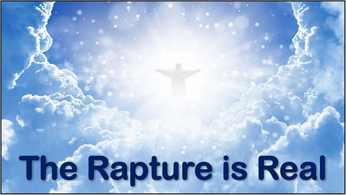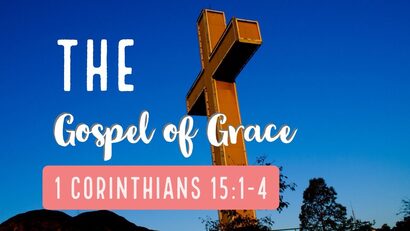The Rapture is Real
The Rapture Is A True Biblical Event
You see, the event we refer to as the “rapture” is an actual biblical event for which the apostles provide much supporting detail.
The word “rapture” comes from a Latin translation of the Bible from about AD 400 called The Vulgate. The Vulgate uses the Latin word rapturo to translate the Greek word harpazo in 1 Thessalonians 4:17.
Starting sometime in the late 1800’s, Bible teachers began using the word “rapture” to describe the event Paul wrote about in 1 Thessalonians 4:13-18 as well as in 1 Corinthians 15:50-56 and Philippians 3:20-21. These students of Scripture chose a word, based on the ancient Latin translation of the Bible, to describe the event that the apostle wrote about in these texts and referred to in many other passages.
The rapture is the “blessed hope” of Titus 2:11-14; it’s the means of our deliverance from the day of the Lord wrath as the Lord promises us in 1 Thessalonians 1:9-10 and 5:1-10.
Jesus’ appearing to take us home to glory is the substance of our hope in a troubled world. It’s critical that we understand it and not dismiss it as though it’s not essential to our Gospel hope or cast it aside as something not essential to our faith as we journey through a dark and dangerous world.
What Happens At The Time Of The Rapture?
Here are the key elements of the event we refer to as the rapture:
1. The Rapture begins with Jesus. 1 Thessalonians 4:16 begins with these words, “For the Lord himself shall descend from heaven.” That’s why the apostles often referred to it as “Jesus’ appearing.” He sets everything in motion when He returns with “those who have fallen asleep” in Christ (1 Thess. 4:14).
2. We will hear Jesus’ voice and the sound of a trumpet…1 Thessalonians 4:16 also tells us that Jesus “will descend…with a shout, with the voice of an archangel, and with the trump of God.” I believe that all of us who are in Christ will hear these sounds; I am not sure about those who do not know Him.
3. The dead in Christ will rise first (1 Thess. 4:16). Jesus will raise from the dead all those who have died “in Christ” from the Day of Pentecost to the time of the rapture. They will be the first to meet the Lord in the air as Jesus joins their resurrected bodies with their souls.
The resurrection of church age saints happens immediately at the start of the rapture.
4. The Lord will then give those believers who are alive at the time of the rapture immortal and imperishable bodies (Phil. 3:20-21; 1 Cor. 15:51-53).
5. The rapture will happen quickly! For those of us who are alive at the time of the rapture, the change in our bodies will happen “in the twinkling of an eye” (1 Cor. 15:52). We will instantly receive our glorified bodies.
6. At the same moment He gives us immortal bodies, Jesus will catch up those of us “we which are alive, who are remain…in the clouds to meet the Lord in the air” (1 Thess. 4:17). We will join those saints resurrected from dead and forever “be with the Lord.”
7. Our destination will be heaven. In John 14:3 Jesus said, “And if I go to prepare a place for you, I will come again and will receive you to myself, so that where I am there ye may be also.” The Lord is preparing a place in heaven, and
He will take us there when He appears. Later, in John 17:24, we see that one of requests in what we call His “high priestly prayer” was that someday we would see the glory He possessed “before the foundation of the world.”
I love the way Colossians 3:4 puts it, “When Christ who is our life, shall appear, then shall ye also appear with him in glory.” When the rapture occurs, we will appear in glory, aka heaven. In other words, it signifies our departure from earth to heaven.
The above seven points provide a quick summary of what we will experience when Jesus comes to take us home. All these things make up the event that we as believers refer to as the “rapture.”
The Only Matter Open For Debate Is The Timing
We who are pre-trib, premillennialists place the rapture before the start of the seven-year tribulation. Premillennialists are those who believe in a literal understanding of biblical prophecy that includes the seven-year tribulation and thousand-year reign of Jesus.
The rapture is not a “third order” doctrine that we must shelve in order to preserve unity with other saints. No, that is what the scoffers tell us (2 Peter 3:1-4; Jude 18-19).
Paul commands us to “comfort one another” with the hope we possess in the rapture (1 Thess. 4:18, 5:11). The Lord intends for us to build up each other in the faith with our shared hope in Jesus’ appearing to take us home to heaven. How is that possible if we relegate Jesus’ imminent appearing to quiet backroom discussions so as not to stir up controversy in the body of Christ?
The Rapture Is The Substance Of Our Hope
Let’s dig a bit deeper into this hope that the Lord tells us to use in comforting “one another” (1 Thess. 4:18, 5:11).
The rapture is our “blessed hope” it’s the hope into which Jesus saves us. I say this based on the words of Romans 8:23-25:
23 And not only they, but ourselves also, which have the firstfruits of the Spirit, even we ourselves groan within ourselves, waiting for the adoption, to wit, the redemption of our body.
24 For we are saved by hope: but hope that is seen is not hope: for what a man seeth, why doth he yet hope for?
25 But if we hope for that we see not, then do we with patience wait for it.
In the above passage, Paul connects the “redemption of our body,” which as we saw happens at the time of the rapture, with the “hope” of the Gospel. The resurrection event for all New Testament saints happens at Jesus’ return for His church, the rapture. It’s at time He will redeem our bodies by giving us immortal ones that will never perish or grow old (1 Cor. 15:51-55).
That’s why I like to refer to Jesus’ appearing as the “Gospel future.”
We see further evidence of the close association of the Gospel with the rapture in 1 Thessalonians 1:9-10. There, the apostle reported how the Thessalonians 9 For they themselves shew of us what manner of entering in we had unto you, and how ye turned to God from idols to serve the living and true God;
10 And to wait for his Son from heaven, whom he raised from the dead, even Jesus, which delivered us from the wrath to come.
These new believers immediately placed their hope in the rapture.
During Paul’s stay in Thessalonica, the rapture was Gospel 101. He did not divorce our hope in Jesus’ appearing from his proclamation of the good news as almost everyone does today.
The New Testament saints eagerly awaited Jesus appearing (Phil. 3:20-21; 1 Cor. 1:7-8, 15:50-56; 1 John 3:1-3). It constituted the substance of their hope; it signified the time when they would experience the eternal life that became theirs through faith.
I cannot say when the rapture will occur because I do not know. We may face increasing persecution because of our faith and perhaps suffer physically because of our faith. Or Jesus may come this very day.
Regardless of what the future holds, we trust in God’s goodness and grace. Because the Lord remains in control of all things, we can rest in His promise to take us home before the start of the tribulation. Because of His grace, we know that we will forever experience joy in His presence as the result of His favor that we most certainly do not deserve (see Ps. 16:11; Eph. 2:1-7).
When we look to Scripture, we see that the rapture is a real event. It’s not something that coincides with human wisdom, but is something the Lord revealed to His apostles (1 Thess. 4:15; 1 Cor. 15:51a) so that we might have hope and encourage each other regardless of the what we face.
You see, the event we refer to as the “rapture” is an actual biblical event for which the apostles provide much supporting detail.
The word “rapture” comes from a Latin translation of the Bible from about AD 400 called The Vulgate. The Vulgate uses the Latin word rapturo to translate the Greek word harpazo in 1 Thessalonians 4:17.
Starting sometime in the late 1800’s, Bible teachers began using the word “rapture” to describe the event Paul wrote about in 1 Thessalonians 4:13-18 as well as in 1 Corinthians 15:50-56 and Philippians 3:20-21. These students of Scripture chose a word, based on the ancient Latin translation of the Bible, to describe the event that the apostle wrote about in these texts and referred to in many other passages.
The rapture is the “blessed hope” of Titus 2:11-14; it’s the means of our deliverance from the day of the Lord wrath as the Lord promises us in 1 Thessalonians 1:9-10 and 5:1-10.
Jesus’ appearing to take us home to glory is the substance of our hope in a troubled world. It’s critical that we understand it and not dismiss it as though it’s not essential to our Gospel hope or cast it aside as something not essential to our faith as we journey through a dark and dangerous world.
What Happens At The Time Of The Rapture?
Here are the key elements of the event we refer to as the rapture:
1. The Rapture begins with Jesus. 1 Thessalonians 4:16 begins with these words, “For the Lord himself shall descend from heaven.” That’s why the apostles often referred to it as “Jesus’ appearing.” He sets everything in motion when He returns with “those who have fallen asleep” in Christ (1 Thess. 4:14).
2. We will hear Jesus’ voice and the sound of a trumpet…1 Thessalonians 4:16 also tells us that Jesus “will descend…with a shout, with the voice of an archangel, and with the trump of God.” I believe that all of us who are in Christ will hear these sounds; I am not sure about those who do not know Him.
3. The dead in Christ will rise first (1 Thess. 4:16). Jesus will raise from the dead all those who have died “in Christ” from the Day of Pentecost to the time of the rapture. They will be the first to meet the Lord in the air as Jesus joins their resurrected bodies with their souls.
The resurrection of church age saints happens immediately at the start of the rapture.
4. The Lord will then give those believers who are alive at the time of the rapture immortal and imperishable bodies (Phil. 3:20-21; 1 Cor. 15:51-53).
5. The rapture will happen quickly! For those of us who are alive at the time of the rapture, the change in our bodies will happen “in the twinkling of an eye” (1 Cor. 15:52). We will instantly receive our glorified bodies.
6. At the same moment He gives us immortal bodies, Jesus will catch up those of us “we which are alive, who are remain…in the clouds to meet the Lord in the air” (1 Thess. 4:17). We will join those saints resurrected from dead and forever “be with the Lord.”
7. Our destination will be heaven. In John 14:3 Jesus said, “And if I go to prepare a place for you, I will come again and will receive you to myself, so that where I am there ye may be also.” The Lord is preparing a place in heaven, and
He will take us there when He appears. Later, in John 17:24, we see that one of requests in what we call His “high priestly prayer” was that someday we would see the glory He possessed “before the foundation of the world.”
I love the way Colossians 3:4 puts it, “When Christ who is our life, shall appear, then shall ye also appear with him in glory.” When the rapture occurs, we will appear in glory, aka heaven. In other words, it signifies our departure from earth to heaven.
The above seven points provide a quick summary of what we will experience when Jesus comes to take us home. All these things make up the event that we as believers refer to as the “rapture.”
The Only Matter Open For Debate Is The Timing
We who are pre-trib, premillennialists place the rapture before the start of the seven-year tribulation. Premillennialists are those who believe in a literal understanding of biblical prophecy that includes the seven-year tribulation and thousand-year reign of Jesus.
The rapture is not a “third order” doctrine that we must shelve in order to preserve unity with other saints. No, that is what the scoffers tell us (2 Peter 3:1-4; Jude 18-19).
Paul commands us to “comfort one another” with the hope we possess in the rapture (1 Thess. 4:18, 5:11). The Lord intends for us to build up each other in the faith with our shared hope in Jesus’ appearing to take us home to heaven. How is that possible if we relegate Jesus’ imminent appearing to quiet backroom discussions so as not to stir up controversy in the body of Christ?
The Rapture Is The Substance Of Our Hope
Let’s dig a bit deeper into this hope that the Lord tells us to use in comforting “one another” (1 Thess. 4:18, 5:11).
The rapture is our “blessed hope” it’s the hope into which Jesus saves us. I say this based on the words of Romans 8:23-25:
23 And not only they, but ourselves also, which have the firstfruits of the Spirit, even we ourselves groan within ourselves, waiting for the adoption, to wit, the redemption of our body.
24 For we are saved by hope: but hope that is seen is not hope: for what a man seeth, why doth he yet hope for?
25 But if we hope for that we see not, then do we with patience wait for it.
In the above passage, Paul connects the “redemption of our body,” which as we saw happens at the time of the rapture, with the “hope” of the Gospel. The resurrection event for all New Testament saints happens at Jesus’ return for His church, the rapture. It’s at time He will redeem our bodies by giving us immortal ones that will never perish or grow old (1 Cor. 15:51-55).
That’s why I like to refer to Jesus’ appearing as the “Gospel future.”
We see further evidence of the close association of the Gospel with the rapture in 1 Thessalonians 1:9-10. There, the apostle reported how the Thessalonians 9 For they themselves shew of us what manner of entering in we had unto you, and how ye turned to God from idols to serve the living and true God;
10 And to wait for his Son from heaven, whom he raised from the dead, even Jesus, which delivered us from the wrath to come.
These new believers immediately placed their hope in the rapture.
During Paul’s stay in Thessalonica, the rapture was Gospel 101. He did not divorce our hope in Jesus’ appearing from his proclamation of the good news as almost everyone does today.
The New Testament saints eagerly awaited Jesus appearing (Phil. 3:20-21; 1 Cor. 1:7-8, 15:50-56; 1 John 3:1-3). It constituted the substance of their hope; it signified the time when they would experience the eternal life that became theirs through faith.
I cannot say when the rapture will occur because I do not know. We may face increasing persecution because of our faith and perhaps suffer physically because of our faith. Or Jesus may come this very day.
Regardless of what the future holds, we trust in God’s goodness and grace. Because the Lord remains in control of all things, we can rest in His promise to take us home before the start of the tribulation. Because of His grace, we know that we will forever experience joy in His presence as the result of His favor that we most certainly do not deserve (see Ps. 16:11; Eph. 2:1-7).
When we look to Scripture, we see that the rapture is a real event. It’s not something that coincides with human wisdom, but is something the Lord revealed to His apostles (1 Thess. 4:15; 1 Cor. 15:51a) so that we might have hope and encourage each other regardless of the what we face.
Much of this is written by By Jonathan C. Brentner, with minor changes and using the KJB! - (rob madden)






